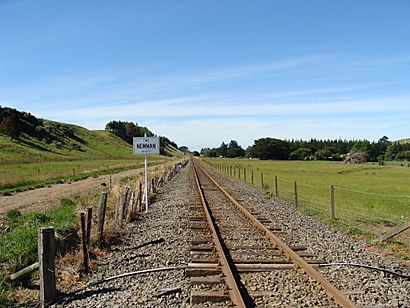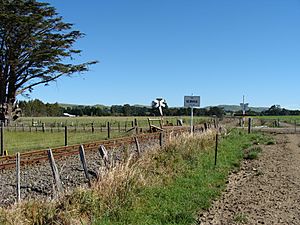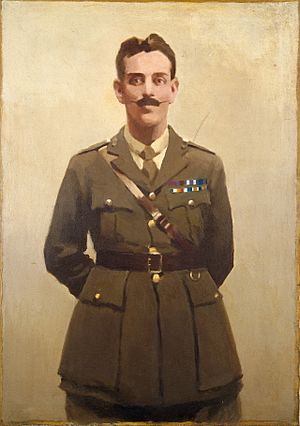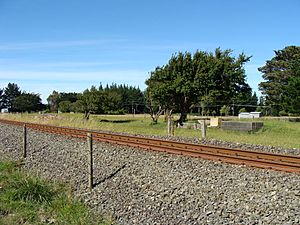Newman railway station facts for kids
The Newman railway station was once an important stop on the Wairarapa Line in the Tararua District of New Zealand's North Island. It served the small farming town of Newman, about 3 kilometers north of Eketahuna. You can find it on Cliff Road, but it's now on private land.
Contents
History of Newman Station
Building the Station
The railway line from Wellington to Woodville crossed the Makakahi River in December 1894. This made it possible to build a station at Newman. At first, only freight (goods) trains used Newman. Passenger trains stopped at Eketahuna because it had better facilities for travelers.
A local timber merchant named Tom Price had a sawmill in Newman called Albion Mill. Before the station was built, he had to transport his timber by cart to Eketahuna. His carts damaged the roads, especially in bad weather. So, when Newman station opened, a special railway siding was built. This siding went from the station directly to his mill.
The mill was a very important customer for the station until it closed in March 1900. Price's mill sent huge amounts of wood, like totara, rimu, and matai, to his timber yard in Petone.
The Nireaha Tramway
One of the most interesting parts of Newman's history is its connection to the Nireaha Tramway. This tramway was used from 1895 to 1900. Unlike many other timber tramways, it was built to high standards, almost like a proper railway. It had strong tracks and used the same narrow track width as the national railway.
Tom Price wanted to build this line to solve his problem of moving timber by road. He was lucky because an economic slowdown meant that work on the main railway line had stopped near Eketahuna. This meant many skilled workers were available, and Price hired them to build his tramway.
The tramway was about 11 kilometers long. It started at Price's Albion Mill and went past the town of Nireaha. It ended at another sawmill Price owned on the Mangatainoka River. Sadly, this second mill burned down soon after it opened and was never rebuilt.
At first, horses pulled the timber wagons on the tramway. Later, a special steam train called an Aveling and Porter locomotive was used. This unique train ran on wood and was brought from England by Price. It started working on July 2, 1896, with a local person as its driver. After the mill closed, the locomotive was moved and later sold. It stopped working in the 1920s.
By 1900, most of the native trees in the area had been cut down. This led Tom Price to close his mill and move his equipment to Dannevirke. Other mill owners in Nireaha still used the tramway with horses. Children from Eastern Nireaha even used the line as a walking path to get to school in Newman.
Train Services
After the main railway line was finished in 1897, Newman became a regular stop for many trains. Later, passenger services were provided by special railcars. These were first the Wairarapa-class railcars, and then the twinset railcars. In 1959, the timetable showed that Newman was a "stops if required" station. This meant trains would stop there if someone needed to get on or off. There were 15 such services each week.
Railcar services on the Wairarapa Line stopped in the mid-1970s. After that, passenger services were provided by trains pulled by locomotives. These services were completely stopped on August 1, 1988. By this time, Newman station had already been closed to passengers for almost 20 years.
What's Left Today
Today, there isn't much left at the old station site to show what was once there. The main loading bank, which was used to load goods onto trains, is still visible. You can also see some remains of a building or another loading area.
Images for kids









